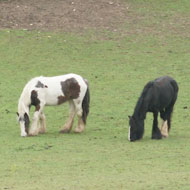
Control of Horses Bill for England approved by House of Lords
A bill to tackle fly-grazing in England has passed through the House of Lords and will become law before the General Election. The move has been welcomed by charities as a positive step for equine welfare.
Under the new legislation, local authorities will have more powers to seize horses that are being illegally fly-grazed on public and private land. They will be able to remove such horses from the land after four days, rather than the current minimum of two weeks.
World Horse Welfare chief executive Roly Owers said: "This law will make a big difference to horse welfare, as charities have been struggling to help the thousands of horses being bred indiscriminately and kept without proper care.
"It will also help landowners, farmers, communities and taxpayers as it will make action to remove horses much more swift, straightforward and less expensive to take."
A similar law was introduced in Wales early last year and it is thought this may have led to a rise in the number of fly-grazed horses in England, as the problem simply crossed the border. It is estimated there are currently more than 3,000 fly-grazed horses in the country.
Fly-grazed horses are often left to fend for themselves without enough food, water and shelter, falling victim serious preventable diseases. Without suitable fencing around the perimeters of the land, these horses are also at risk of traffic accidents if they escape onto busy roads and motorways.
Redwings Horse Sanctuary celebrated the bill's approval but chief executive Lynn Cutress said "the fight against fly-grazing has yet to be won", calling for a centralised database of horse and owner information and greater enforcement of compulsory horse passports and microchipping.
Image courtesy of Redwings Horse Sanctuary



 The veterinary mental health charity Vetlife is inviting the veterinary community to join it for a sponsored cold-water dip.
The veterinary mental health charity Vetlife is inviting the veterinary community to join it for a sponsored cold-water dip.